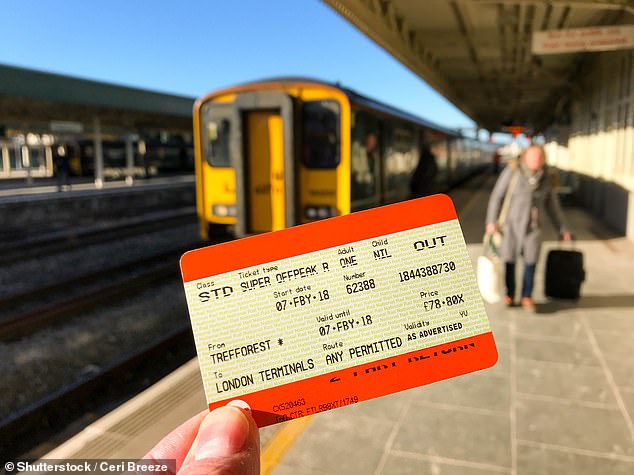Train fares will be frozen until March… before soaring by 2.6%: Passengers will bear the brunt of Government’s bailout of rail companies during pandemic
- Fares usually rise in January and are linked to the retail prices index (RPI)
- The cost of an average annual season ticket will go up from £3,064 to £3,144
- Fare rise comes as passenger numbers remain at less than 50% of pre-pandemic levels
Train fares will rise by 2.6 per cent from March 1 as passengers bear the brunt of the Government’s multi-billion bailout of rail operators.
The increase is the first above-inflation rise since 2013 and will see the cost of an average annual season ticket go up from £3,064 to £3,144.
Fares usually rise in January and are linked to the retail prices index (RPI), a measure of inflation which was announced as 1.6 per cent in July.
Train fares will rise by 2.6 per cent from March 1 as passengers bear the brunt of the Government’s multi-billion bailout of rail operators. The increase is the first above-inflation rise since 2013 and will see the cost of an average annual season ticket go up from £3,064 to £3,144 [Stock photo]
Insiders say the Treasury has been pushing for an increase of 1 per cent above the RPI amid concerns over the multi-billion pound cost of propping up rail firms during the pandemic.
The Department for Transport had hoped to sweeten the deal with an announcement around flexible season tickets, but sources say this has been indefinitely delayed as passenger numbers stagnate.
In better news for commuters, the delay will give them several weeks to buy an annual pass at 2020 prices.
The 2.6 per cent figure relates to regulated fares, which make up around half of all fares and include season tickets on most commuter routes.
Last night’s announcement will spark concern among rail bosses who fear a significant rise will continue to drive customers away.
Passenger numbers were at 28 per cent of pre-pandemic levels on Monday, according to official figures.
The level has not risen above 43 per cent since the end of March and has been in steady decline since September.
Around £3.5billion of taxpayers’ money was spent on plugging the shortfall in ticket revenues during the first six months of the pandemic.
The Department for Transport announced in September that the arrangements – which effectively renationalise the rail network – will be extended until at least March 2022.
At the time Sir Michael Holden, who used to run South West Trains, said the emergency measures were ‘the worst possible arrangement to run the railways’.
Rail minister Chris Heaton-Harris said yesterday: ‘Delaying the change in rail fares ensures passengers who need to travel have a better deal this year.’
He added: ‘By setting fares sensibly, and with the lowest actual increase for four years, we are ensuring that taxpayers are not overburdened for their unprecedented contribution.’
But Paul Tuohy, of the Campaign for Better Transport, said he was bitterly disappointed at the fare rise ‘just as people will be returning to workplaces next year’.
He added: ‘We understand that the Treasury needs to recoup some of the money… but the way to do that is by encouraging passengers back on to the trains, not by pricing them off.’
